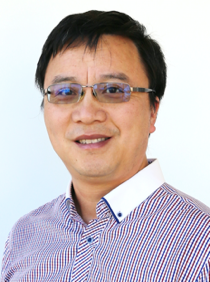
Prof. Yun Wang
ASME Fellow and RSC Fellow; Mechanical and Aerospace Engineering, University of California, Irvine, USA
Title: Neutron Radiography and Convolutional Neural Network Analysis for Proton Exchange Membrane Fuel Cell
Abstract:
Polymer exchange membrane (PEM) fuel cells produce water as byproduct, which may cause electrode “flooding” and reduce cell performance. In operation, water usually builds up downstream in the gas flow channel due to the water production by the oxygen reduction reaction (ORR), leading to a water spatial distribution [1]. Neutron radiography has developed as a powerful tool for water in situ visualization and quantification in fuel cells. This is achieved by sending a beam of collimated thermal neutrons through a working fuel cell and measuring the attenuation of the transmitted neutrons [2]. Machine learning has received a growing attention for engineering applications in recent years. Deep learning, as a subset of machine learning, employs neural networks to characterize and learn from big data. It is advantageous in exploring intricate structures in high-dimensional data and has been widely applied to many domains of science, business, and government. Convolutional neural networks (CNN) are a popular deep learning method, commonly used in analyzing visual images, such as image recognition, processing, and classification. In this talk, I will introduce our recent work on neutron radiography for PEM fuel cell diagnostics. Neutron radiography images will be presented to probe liquid/ice water contents at various operating conditions, material configurations [2], and resolutions [3]. A CNN model [4,5] is developed to quickly analyze images from neutron radiography for water content and spatial variation. The machine learning model can be extended to analyze X-ray, SEM, TEM, optical, and MRI images.
Ref.
[1] Zhang, G., Qu, Z., Tao, W. Q., Mu, Y., Jiao, K., Xu, H., & Wang, Y. (2024). Advancing next-generation proton-exchange membrane fuel cell development in multi-physics transfer. Joule, 8(1), 45-63.
[2] Mishler, J., Wang, Y., Mukundan, R., Spendelow, J., Hussey, D. S., Jacobson, D. L., & Borup, R. L. (2012). Probing the water content in polymer electrolyte fuel cells using neutron radiography. Electrochimica acta, 75, 1-10.
[3] Mishler, J., Wang, Y., Mukherjee, P. P., Mukundan, R., & Borup, R. L. (2012). Subfreezing operation of polymer electrolyte fuel cells: Ice formation and cell performance loss. Electrochimica Acta, 65, 127-133.
[4] Pang, Y., Hao, L., & Wang, Y. (2022). Convolutional neural network analysis of radiography images for rapid water quantification in PEM fuel cell. Applied Energy, 321, 119352.
[5] Pang, Y., & Wang, Y. (2023). Water spatial distribution in polymer electrolyte membrane fuel cell: Convolutional neural network analysis of neutron radiography. Energy and AI, 14, 100265.
Biography:
Yun Wang received his B.S. and M.S. degrees in Mechanics and Engineering Science from Peking University in 1998 and 2001, respectively. He went to the Pennsylvania State University where he earned his Ph.D degree in Mechanical Engineering in 2006. Dr. Wang joined the MAE (Mechanical and Aerospace Engineering) faculty at the University of California, Irvine in 2006. He has produced over 100 publications on PEM fuel cell, Li-air battery, and other energy systems, including three books on PEM Fuel Cell. Dr. Wang served as Track chair/co-chair, session chair/co-chair, conference chair and committee member for many international conferences on fuel cell, thermal energy, and machine learning. He is currently Professor at the UC Irvine, ASME fellow, RSC fellow, and associate editor for the journal of heat and mass transfer.